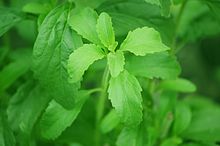Portal:Food/Selected ingredient/8

Stevia (/ˈstiːviə, ˈstɛviə/) is a sweet sugar substitute that is about 50 to 300 times sweeter than sugar. It is extracted from the leaves of Stevia rebaudiana, a plant native to areas of Paraguay and Brazil. The active compounds in stevia are steviol glycosides (mainly stevioside and rebaudioside). Stevia is heat-stable, pH-stable, and not fermentable. Humans cannot metabolize the glycosides in stevia, and it therefore has zero calories. Its taste has a slower onset and longer duration than that of sugar, and at high concentrations some of its extracts may have an aftertaste described as licorice-like or bitter. Stevia is used in sugar- and calorie-reduced food and beverage products as an alternative for variants with sugar.
The legal status of stevia as a food additive or dietary supplement varies from country to country. In the United States, certain high-purity stevia glycoside extracts have been generally recognized as safe (GRAS) and may be lawfully marketed and added to food products, but stevia leaf and crude extracts do not have GRAS or Food and Drug Administration (FDA) approval for use in food. The European Union approved Stevia rebaudiana additives in 2011. In Japan, stevia has been widely used as a sweetener for decades. (Full article...)
